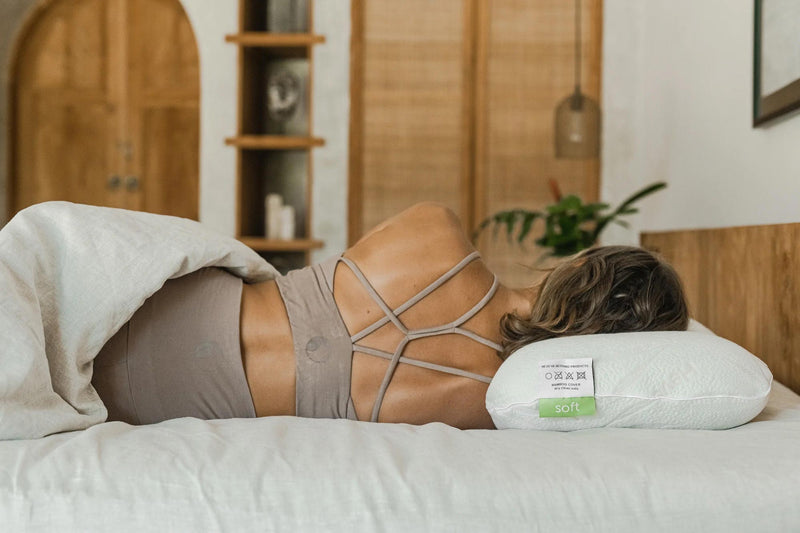Having trouble sleeping during pregnancy? You’re not alone. Many expectant mothers experience restlessness, heartburn, and discomfort, making it difficult to find a supportive sleeping position, often resulting in disrupted sleep.
This guide explores the best sleep positions to support both you and your growing baby. You'll also learn how pregnancy pillows can enhance comfort and discover simple tips to improve sleep quality. Prioritising rest is essential during pregnancy, and with the right approach, you can enjoy more restorative nights, even if you're facing insomnia during pregnancy.
Understanding Pregnancy and Sleep: What's Happening to Your Body?
Pregnancy is a transformative time, but the physical and hormonal changes can significantly disrupt your sleep. If you're struggling to get a good night’s rest, you’re not alone. According to the National Sleep Foundation, approximately 78% of pregnant women experience sleep disturbances, including common issues like insomnia during pregnancy, which are often due to a combination of shifting hormones, a growing bump, and changes in sleep patterns.
Hormonal Changes and a Growing Bump
Hormones like progesterone and oestrogen play a vital role in supporting your pregnancy, but they can also wreak havoc on your rest. Increased anxiety, nausea (especially in the first trimester), and restless leg syndrome are all common symptoms that may make it harder to relax and fall asleep, frequently leading to disrupted sleep patterns.
As your baby grows, your bump starts to affect everything! This includes your breathing, circulation, and sleeping positions. The expanding uterus can put pressure on your diaphragm, making deep breathing more difficult, and compress major blood vessels, which may affect circulation and lead to back pain. The extra weight can also misalign your spine and increase pressure on your bladder, leading to more frequent night-time bathroom trips.
Other Common Sleep Disruptions
Beyond hormones and physical discomfort, pregnancy can bring about other sleep-related changes. You may feel unusually tired during the day, need more sleep than usual, or experience vivid dreams, often triggered by subconscious anxieties about parenthood. In some cases, sleep disorders like Restless Legs Syndrome (RLS) or sleep apnoea may emerge or worsen, further impacting your ability to rest well.
The Best Pregnancy Sleeping Positions (and the Ones to Avoid!)
Right, let’s get down to the nitty-gritty: which pregnancy sleeping positions are going to give you the best chance of a restful night?
Side Sleeping: The Golden Standard
Generally speaking, side sleeping is the bee's knees during pregnancy. It's the pregnancy sleeping position most doctors recommend. And, if you can, try to favour your left side.
Left-Side Preference: Why the left? It improves blood flow to the baby and placenta, helps your kidneys work efficiently (reducing swelling), and can ease digestion and heartburn. While sleeping on your right isn't generally considered unsafe, it doesn't provide these specific benefits as effectively and may slightly compress a major blood vessel compared to the left. Therefore, the left side is viewed as the optimal position for supporting both your health and your baby's. Don't stress if you occasionally find yourself on your right, but consciously choosing the left side when settling down is the preferred approach.

Sleeping on Your Back: A No-Go Zone?
As tempting as it might be to sprawl out on your back, it’s generally best to avoid this pregnancy sleeping position, especially in the later stages. Why?
- Reduced blood flow: The weight of your uterus can compress the vena cava, a major blood vessel that returns blood to your heart. This can reduce blood flow to both you and the baby.
- Back pain: It can worsen back pain.
- Haemorrhoids: Pressure can worsen these.
- Digestive Issues: Can cause issues such as acid reflux.
However, if you wake up on your back, don’t panic! Just roll back onto your side. You can prop yourself up with pillows to make it less likely you'll roll over again.
Sleeping on Your Stomach: Until It's Impossible
In the early stages of pregnancy, sleeping on your stomach may still feel comfortable. However, as your bump grows, this position becomes increasingly difficult. Some expectant mothers use a donut-shaped pregnancy pillow to extend the time they can sleep on their stomachs, but ultimately, your body will signal when it’s time to adjust to a new position for better comfort and support.
Maternity Pillows: Your Secret Weapon for Sleep
Maternity pillows are frequently recommended to promote improved sleep quality for pregnant individuals. These specialised pillows offer adaptable support, facilitating the adoption of clinically preferred sleep orientations. Several configurations exist, each engineered to address distinct physical requirements and comfort expectations. Let's explore the different types of maternity pillows available on the market, each designed to cater to individual needs and preferences.
Types of Pregnancy Pillows
- U-shaped pillows: Provide full body support, cradling you from head to toe. Great for side sleeping. The downside? They can take up a lot of space in your bed.
- C-shaped pillows: Similar to U-shaped, but more versatile. Can be used in various pregnancy sleeping positions.
- Wedge pillows: Small and versatile. Can be used to support your belly, back, or head. Ideal for travel.
- Bolster pillows: Cylindrical pillows that can be used for targeted support. Excellent for placing between the knees to relieve hip and back pressure, or behind the back for added support while sitting or sleeping on your side. They are smaller and more versatile than full-body pillows.
How to Choose the Right Pregnancy Pillow
- Consider your sleeping style: Do you like to be surrounded by pillows?
- Think about your body size: While full-body support is desirable, some may find certain pillow shapes restrictive.
- Set a budget: Pregnancy pillows range in price.
- Look for hypoallergenic materials: Especially important if you have allergies.
- Check for a washable cover: Accidents happen!
Beyond Pregnancy
Your pregnancy pillow isn’t just useful during pregnancy or for sleep, it can continue to support your comfort well beyond the bump. This can be used far past pregnancy too! Once the baby arrives, pregnancy pillows are brilliant for nursing support and keeping you supported while breastfeeding.
Tips and Tricks for a Comfy Night's Sleep During Pregnancy
Getting comfortable during pregnancy isn’t just about sleep positions; it’s part of a bigger picture of overall rest and support. Let's explore some other handy tips and tricks to help you drift off into dreamland.

Create a Relaxing Bedtime Routine
Create a calming bedtime routine to help your body transition into rest mode. Try incorporating:
- A warm bath: Epsom salts can help ease muscle tension and promote relaxation.
- Soft, soothing music: Think classical melodies or gentle nature sounds.
- Reading (avoid screens): Opt for reading instead of screens, as blue light can disrupt your sleep.
- Light stretching: Release any built-up tension and help your body unwind.
Optimise Your Sleep Environment
Your bedroom should be a haven for sleep. Aim for a space that’s dark, quiet and cool, the key ingredients for quality rest. Use blackout curtains to block out unwanted light and consider a white noise machine to help mask disruptive sounds. Maintaining a comfortable, well-ventilated room temperature can also make a significant difference in how well you sleep.
Manage Heartburn and Nausea
Heartburn and nausea can seriously disrupt your sleep, impacting your ability to find comfort and often exacerbating issues like insomnia during pregnancy.
- Eat smaller, more frequent meals: This helps to avoid an overly full stomach.
- Avoid lying down immediately after eating: Wait at least two to three hours.
- Elevate your head with pillows: This helps to keep stomach acid down, and lie on your left side to support better digestion.
Stay Hydrated (But Not Too Much Before Bed)
Staying hydrated is crucial during pregnancy, but drinking large amounts of water right before bed can lead to frequent nighttime bathroom trips that disrupt your rest. To stay well-hydrated without affecting your sleep, focus on drinking plenty of water throughout the day and begin limiting fluid intake a few hours before bedtime.
Gentle Exercise
Regular exercise can improve sleep during pregnancy, but it’s best to stick with what your body is used to. If you were active before, you can likely continue with adjustments. Avoid starting intense new workouts, but consider gentle options like prenatal yoga or daily walks. These are especially beneficial as they provide fresh air and sunlight, helping to regulate your circadian rhythm, while also easing backaches, supporting childbirth, and aiding recovery.
Breathing Exercises
Practice breathing exercises and relaxation techniques that can help calm the mind and prepare the body for sleep. Deep breathing can reduce stress and promote relaxation. Take a few deep breaths, inhaling slowly through the nose and exhaling through the mouth. While there are many breathing techniques, a simple one to try is:
Box Breathing:
- Inhale slowly and deeply through your nose for a count of 4.
- Hold your breath for a count of 4.
- Exhale slowly through your mouth for a count of 4.
- Hold your breath for a count of 4.
- Repeat for 5-10 minutes. You can adjust the count as needed.
Stay Consistent
Try to maintain a consistent sleep schedule by going to bed and waking up at the same time every day, even on weekends. This will help regulate your body's natural sleep-wake cycle and improve sleep quality, which is crucial when dealing with disrupted sleep.
Consider Professional Help
Don't hesitate to consult with a healthcare professional if your sleep problems persist or worsen. They can provide guidance and treatment options tailored to your specific needs, especially if you are having difficulties sleeping.
Pelvic Girdle Pain
For those experiencing pelvic girdle pain during pregnancy, maintaining a supportive sleep posture is essential to reducing discomfort. Consulting a qualified physiotherapist is highly recommended, as they can assess your specific condition and offer personalised guidance on the best sleep positions for your stage of pregnancy.
The Heveya® Pregnancy Pillow: Unmatched Comfort and Support for You and Your Baby
Prioritise restful sleep throughout your pregnancy with the Heveya® Natural Organic Latex Pregnancy Pillow. This thoughtfully designed U-shaped pillow provides full-body support, adapting to your changing body to relieve pressure points and enhance comfort. Whether you’re resting on your side, reclining in bed, or simply relaxing, its shape promotes optimal alignment, reducing discomfort and encouraging deeper, more restorative sleep.

Crafted from natural organic latex, this pillow is not only exceptionally comfortable but also naturally breathable and hypoallergenic, making it ideal for those with sensitive skin or allergies.
The sustainably sourced materials reflect Heveya®’s commitment to both your well-being and the environment, offering a high-quality, long-lasting solution for better sleep.
Investing in Sleep: Finding a Mattress for a Comfortable Pregnancy
Optimising your sleeping position and using a pregnancy pillow are undeniably crucial for comfort. However, the foundation for truly restful sleep often gets overlooked: the mattress. Consider it the base upon which a comfortable pregnancy is built. As the body undergoes significant transformations, a supportive mattress becomes paramount.

A good mattress can alleviate pressure points, promote proper spinal alignment, and minimise discomfort. Choosing the right mattress can have a profound impact on sleep quality and overall well-being throughout the entire pregnancy.
Choosing Heveya® means investing in more than just a pillow; it’s a commitment to healthier sleep, enhanced pregnancy comfort, and a more sustainable future. Experience the difference with a pregnancy pillow designed to support you every step of the way. We wish you a smooth and comfortable pregnancy journey.














